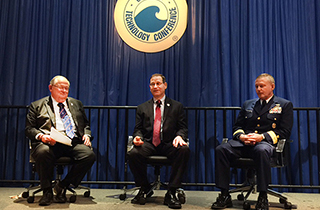Maritime Commons provided a wrap-up of what was covered by the U.S. Coast Guard and the Bureau of Safety and Environmental Enforcement (BSEE) at the 2016 Offshore Technology Conference (OTC) in Houston earlier this month.
Rear Adm. Paul Thomas, assistant commandant for U.S. Coast Guard prevention policy, and BSEE Director Brian Salerno appeared on a panel titled, "Perspectives Regarding Safety and Safety Management from Senior Regulatory Leadership." The panel was moderated by Charlie Williams, executive director for the Center for Offshore Safety (COS), an industry sponsored organization focused exclusively on offshore safety on the U.S. Outer Continental Shelf. Here is the condensed version of Thomas and Salerno’s remarks.
Question: Can you talk about well intervention regulation?
Thomas: It’s not all that different from other operations that are currently happening. We have memorandums of understanding that parse out our agency responsibilities and in what areas we have joint responsibility. These same rules apply to well intervention. That’s why it’s so critical that we talk about this at the National Offshore Safety Advisory Committee. We’ll be working directly with Director Salerno on that and BSEE will add a great deal of value.
Salerno: From my perspective, there’s still some work to be done in this area. Well intervention does fall under BSEE regulations; however, when these activities are performed from a vessel, the proper regulatory activities must be organized and coordinated. That’s important to both of us. Analyzing the gaps and mapping out a coordinated and consistent way forward is key for both of our agencies.
Question: Do you think scenario-based training is valuable in areas such as cyber as well?
Thomas: Scenario-based training is an important framework for this process. With regard to cyber, the scenarios aren’t that different from the physical scenarios we face. We just have to think about it in the same ways. As an example, we have procedures in place to build up, tear down and restart pumps, but not necessarily those same procedures for the software that runs the pump. It’s not a huge leap to determine what could go wrong.
Question: Are there going to be more efforts to categorize wells by their potential impacts (based on the size) if a spill were to occur? Are regulatory agencies scaling their response planning to the different sizes, specifically?
Answer provided by the Coast Guard’s Office of Marine and Environmental Response: The Coast Guard works with the Department of the Interior to ensure vessels and facilities are properly regulated and implement sufficient response requirements in accordance with their planned operations. Often, the operations include both Coast Guard and BSEE/BOEM requirements (vessel/ facility inspection requirements, oil spill response planning, and source control to name a few). Therefore, the Coast Guard and BSEE coordinate together to carefully review response plans to ensure operators and response organizations can sufficiently mitigate any impacts to the environment as a result from offshore operations.
Question: What are the most important things to you and your agencies?
Salerno: The collection and sharing of safety related data is the piece that is of most interest to us right now. The real issue is in coming up with the right data sharing protocols so that everyone feels comfortable participating and sharing information for the benefit of the industry as a whole. Still a lot of work to do here but I think we’re on the right path. I encourage continued involvement by industry.
Thomas: My real focus and area of concern is how we come out of this downturn of operations. We have literally hundreds of service vessels laid up right now and the last thing that we want to be is the speed bump to recovery. I think we’ll need your help to identify when the uptake happens and help us prioritize to get you back to work as soon as possible. We’re going to work that issue through our partnerships, groups like COS, and all stakeholders, to suggest ways that we can manage this. I’d just like to encourage the discussion to continue. If you have a question, send it our way. You can tweet, comment on our blog, or any other method. We are trying to be as transparent as possible in this entire process. If you send us a question, we will provide you with an answer.
Salerno and Thomas want to continue this discussion on Maritime Commons. If you want to follow up with any thoughts or questions, post them at Maritime Commons or to Twitter using the hashtag #BSEEUSCG.
In addition to this post, be sure to read the entire series from the 2016 Offshore Technology Conference.




